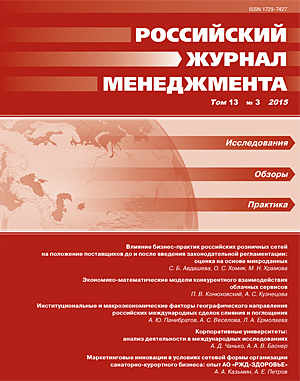Корпоративные университеты: анализ деятельности в международных исследованиях
Аннотация
Корпоративные университеты становятся обязательным элементом системы внутрифирменного обучения во все большем количестве российских компаний. В этой связи знакомство с лучшим мировым опытом их создания и развития приобретает критическое значение для отечественных специалистов. Изучение такого опыта становится более продуктивным при понимании общих принципов анализа деятельности корпоративных университетов, распространенных в международной практике. Статья посвящена систематизации малоизвестных в России теоретических концепций ведущих зарубежных исследователей и экспертов, описывающих многообразие современных корпоративных университетов. Авторами модифицируется взятый в качестве основы подход к структурированию анализа деятельности корпоративного университета, предложенный Э. Луи Абель и Дж. Ли. В статье выявлено и описано пять профилей (аспектов) деятельности корпоративного университета: организационный, образовательный, операционный, партнерский и маркетинговый, каждый из которых раскрывается набором поддающихся управленческому воздействию характеристик их деятельности. Представленная схема может служить основой для сравнительного анализа и дальнейших эмпирических исследований корпоративных университетов России с применением международно признанных критериев их изучения.
Ключевые слова:
корпоративные университеты, корпоративное обучение, самообучающаяся организация
Скачивания
Библиографические ссылки
Translation of references in Russian into English
Загрузки
Опубликован
Как цитировать
Выпуск
Раздел
Лицензия
Статьи журнала «Российский журнал менеджмента» находятся в открытом доступе и распространяются в соответствии с условиями Лицензионного Договора с Санкт-Петербургским государственным университетом, который бесплатно предоставляет авторам неограниченное распространение и самостоятельное архивирование.





